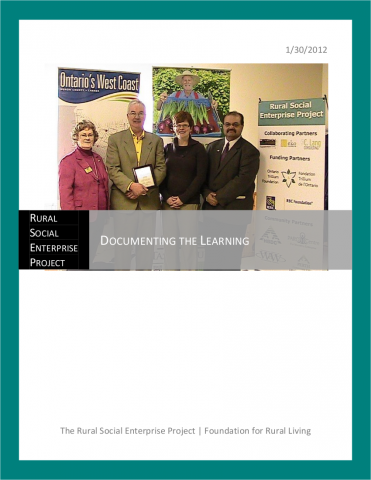Funded by the Ontario Trillium Foundation, the project followed an earlier pilot in 2010 through the United Way of Greater Simcoe, supported by the federal Community Capacity-Building Program through Nottawasaga Futures.
Both initiatives documented significant interest from, and need among, rural nonprofits in and for social enterprise development support. Specifically, the projects demonstrated that:
- There are a large number of rural nonprofits engaged in social enterprise at various stages of development, from early stage to mature.
- There is a pent-up desire for SE skills training and capacity-building.
- There is a general lack of capacity- building and knowledge of SE tools, resources, policies and sector supports available to rural nonprofits.
- There exists little regional infrastructure to support ongoing capacity development and investment for rural SE.
- There is little connection among rural SEs or to the growing SE sector in Canada, including urban and rural linkages.
The project sought to contribute to the resilience and resource development capacity of rural nonprofits by promoting knowledge, skills and supports for social enterprise development. The collaboration also provided the opportunity to involve partners in peer learning, documenting and sharing information on the needs of rural nonprofits for social enterprise capacity building and supports. The report that follows presents some of this learning. The voices and experience of RSEP participants, partners and supporters are integrated into the text and featured in the quotations and vignettes throughout the report.
Download PDF now
Table of Contents
Preface: Overview of Rural Social Enterprise Project (RSEP)
Partners and Acknowledgements
Introduction
Learning Themes
Rural nonprofits are sustained by volunteers
Social enterprise is a sustainability strategy
Nonprofit sector identity is evolving
The language of social enterprise is new
There is pent up demand for SE support in rural
The development path is not linear
Regional capacity for SE development needs co-ordination
There is no one approach to regional SE development
Social enterprise can benefit from municipal support
Collaboration adds complexity
Social enterprise creating employment
Social Enterprise Trends and Ideas
Food System Social Enterprises
Co-operatives
Use of Internet
Replication of SE models
Social Entrepreneurship
Rurality and Social Enterprise
Looking Forward
RSEP Quick Facts
